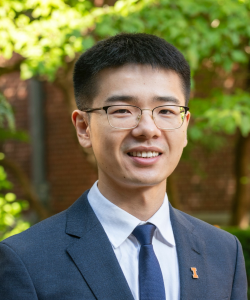Yang Gao Alumni Profile

Yang Gao ’21S (PhD)
Assistant Professor
University of Illinois Urbana-Champaign
By Ashley Rabinovitch
Yang Gao was an undergraduate student at Tianjin University in the early 2010s, a time of meteoric growth in social media usage. The Chinese version of Twitter, Weibo, had just launched, and the online behavior of Gao’s peers was a source of constant fascination to him.
“I frequently met people who were very quiet and private in person but active and opinionated on social media,” he remembers. “That phenomenon is what first sparked my interest in learning more about the impact of social media.”
Gao was studying information systems with the goal of learning how to leverage technology to improve business operations. As he became more intrigued by social media, he spotted an opportunity to marry his interests by researching how companies respond to their customers on various social media platforms.
Gao found an ideal mentor in Huaxia Rui, Xerox Professor of Computers & Information Systems, who shared his research interests and inspired new directions. “The opportunity to work with someone who was conducting high-quality research in my exact field of interest was a major reason to pursue a PhD at Simon,” Gao says. Under Rui’s supervision, Gao engaged in research at the intersection of customer service, social media, and AI/machine learning.
The first part of his dissertation involved collecting Twitter data from 2006 to 2020, along with reviews from six online healthcare platforms, to determine a possible connection between customer voices on social media and drug recalls. It was a noisy, messy dataset, he remembers, but he was able to demonstrate that customers who posted about adverse drug reactions on social media could effectively expedite the time to recall.
The second part of his dissertation explored the willingness of customers to engage with chatbots rather than customer service agents. The results were surprising. “We are hearing more and more talk about companies turning to AI for customer service, but our research demonstrated that emotionally charged customers are still more willing to interact with human agents,” he says.
Now an assistant professor at the University of Illinois Urbana Champaign, Gao is collaborating with Rui to dig deeper into similar topics. One upcoming paper will reveal gender bias in customer service via social media, pointing to a higher engagement rate when customers are served by female customer service agents. Ironically, customers tend to be more verbally negative towards female service agents. “This finding is noteworthy because it tells us that female agents are experiencing a heavier emotional burden while serving customers,” says Gao. In the future, Gao plans to research physicians who use social media accounts to engage with current and potential patients. He also plans to branch out into emerging topics, including the impact of ChatGPT and other large language models on the labor market. | “Ultimately, I am who I am, and I can do what I enjoy doing because of my Simon experience,”
—Yang Gao ’21S (PhD) |
"I suspect we will see an accelerating divide in earning potential,” he reflects. "Workers who have the skills to develop or use these new tools to boost their productivity will earn significantly more than the workers who do not have the skills to adapt or whose jobs will be replaced by generative AI."
Gao credits his “systematic and rigorous training” at Simon for equipping him with the right set of tools to explore novel research directions. “Ultimately, I am who I am, and I can do what I enjoy doing because of my Simon experience,” he says.
